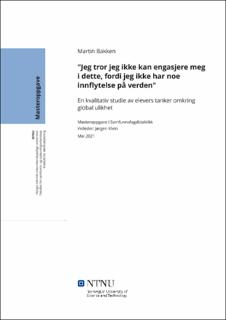| dc.contributor.advisor | Klein, Jørgen | |
| dc.contributor.author | Bakken, Martin | |
| dc.date.accessioned | 2021-09-28T17:52:20Z | |
| dc.date.available | 2021-09-28T17:52:20Z | |
| dc.date.issued | 2021 | |
| dc.identifier | no.ntnu:inspera:76470112:37971470 | |
| dc.identifier.uri | https://hdl.handle.net/11250/2785139 | |
| dc.description.abstract | Ifølge FNs bærekraftmål skal ulikheten mellom land reduseres og fattigdom i alle dets former utryddes innen 2030. Dette er arbeidsplanen for den globale dugnaden Norge har forpliktet seg til å delta på, og vil dermed i stor grad være med å diktere hvilke områder samfunnet er nødt til å fokusere på. Disse fokusområdene reflekteres også i det nye læreplanen (LK20), hvor bærekraftig utvikling er blitt et tverrfaglig tema.
Med dette som bakteppe forsøker denne studien å belyse norske tiendeklassingers tanker omkring og forståelse av den globale ulikheten. I studien har elevenes oppfatninger av årsaker til og løsninger på de de store forskjellene mellom det globale nord og sør blitt undersøkt, i tillegg til deres forståelse av sin egen rolle tilknyttet denne globale utfordringen. For å få innsikt i disse tankene har det blitt gjennomført en kvalitativ spørreundersøkelse i tre tiendeklasser, som er blitt analysert gjennom en kvalitativ innholdsanalyse med diskursanalytiske innslag. Funnene vil bli drøftet opp mot global utviklingsteori og global medborgerskapsundervisning.
Analysen avdekket først og fremst et mangfold av ulike forestillinger og forståelser av aspekter tilknyttet den globale ulikheten. Elevene fordeler seg jevnt utover de som baserer årsaksforklaringene sine på moderniseringsteori, avhengighetsteori og en kombinasjon av begge disse. Elevenes syn på løsninger er preget av en moderniseringsorientert tilnærming, hvor strategiene hovedsakelige baserer seg på at nord skal hjelpe sør med pengeoverføringer, lån, industrialisering, demokratisering, utdanning og kunnskap. Selv om avhengighetsteoretiske tilnærminger ikke er like fremtredende, er det likevel en del av elevene som baserer løsningene sine på globale strukturendringer. Studien indikerer en sammenheng mellom moderniseringsorienterte årsaksforklaringer og moderniseringsorienterte strategier, men finner ingen klar forbindelse mellom avhengighetsteoretiske forklaringer og strategier basert på en bestemt utviklingsteoretisk diskurs.
De fleste av elevene mener at den globale ulikheten er noe de bør engasjere seg i, og for majoriteten av disse bygger dette ansvaret på solidariske og moralske prinsipper. Deres oppfatning av eget aktørskap dreier seg i stor grad om bistand og veldedighet, men det er også en del som viser til at de kan være pådrivere for endring ved å påvirke politikere, stemme ved valg og ta etiske forbrukervalg. Flere av elevene føler imidlertid på en maktesløshet i møte med den globale ulikheten, og de færreste av elevene oppfatter seg selv om delaktig i urettferdige strukturer som opprettholder ulikheten. I tillegg bærer elevbesvarelsene preg av eurosentriske og orientalske holdninger. | |
| dc.description.abstract | According to the UN sustainability goals, inequality among countries must be reduced and poverty in all its forms must be eradicated within 2030. This is a set of global goals the world community, including Norway, has committed themselves to, and thus dictate the areas of focus in society. This is also reflected in the new curriculum (LK20), where sustainable development has become an interdisciplinary topic.
On this note, this study attempts to shed light on Norwegian students’ thoughts about global inequality. The focus areas of this thesis have been to explore the students' perceptions of causes and solutions to the vast differences between the global north and south, in addition to their understanding of their own role regarding this global challenge. To examine these thoughts, a qualitative survey has been conducted in three classes in lower secondary school, which has been analyzed through the lens of a qualitative content analysis. The findings are discussed in light of development theory and global citizenship ecucation.
The analysis first and foremost highlighted a diversity of different representations and understandings of aspects in relation to global inequality. The students are evenly distributed across those who base their causal explanations on modernization theory, dependency theory and a combination of both. The students' solutions are characterized by a modernization-oriented approach, where the strategies are mainly based on north aiding south with money transfers, loans, industrialization, democratization, education and knowledge. Although dependency theory approaches are not as prominent, there are still some students who base their solutions on changes in global structures. The study also indicates a coherence between modernization-oriented explanations and modernization-oriented solutions, but find no such connection between explanations based on dependency theory and any other specific strategy.
Most of the students believe that they should engage in reducing global inequality, and to the majority of these, this engagement is based on solidarity and moral principles. Their perception of their own possibilities to make a difference largely consists of aid and charity, but there are also some who point out that they can impose change by influencing politicians, voting in elections and making ethical consumer choices when shopping. However, many of the students feel powerless and futile in the face of global inequality, and hardly any of the students seem to deem themselves as complicit in unjust structures that produces inequality. In addition, the students’ responses were characterized by Eurocentric attitudes similar to those described in Orientalism. | |
| dc.language | nob | |
| dc.publisher | NTNU | |
| dc.title | Jeg tror jeg ikke kan engasjere meg i dette, fordi jeg ikke har noe innflytelse på verden | |
| dc.type | Master thesis | |
